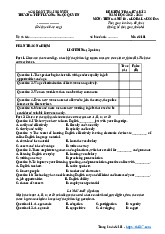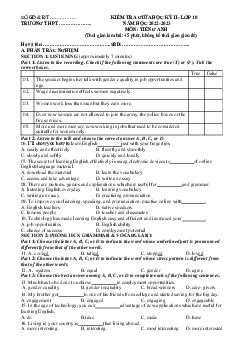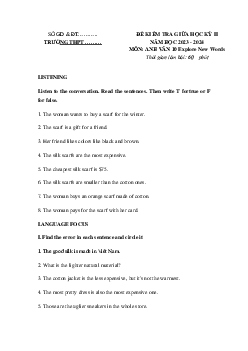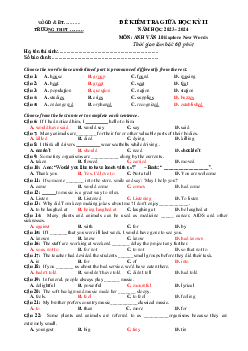









Preview text:
SỞ GD & ĐT …………….
KIỂM TRA GIỮA HỌC KỲ II- LỚP 10
TRƯỜNG THPT ……………….. NĂM HỌC 2023-2024 MÔN: TIẾNG ANH
(Thời gian làm bài: 45 phút, không kể thời gian giao đề)
Họ và tên:…………………………………..SBD:………………………………….. A. PHẦN TRẮC NGHIỆM
SECTION 1: LISTENING (approximately 7 minutes)
Part 1: Listen to the recording. Check if the following statements are true (T) or (F). Tick the correct boxes. True False 01.
The speaker begins her talk with gender equality in job opportunities and age. 02.
Wage discrimination affects women nagatively. 03.
Women work less than man but they earn more. 04.
Even now women are not allowed to join the army, the police forces or the fire services. 05.
More and more men are now working in jobs that used to be considered suitable for wonem only.
Part 2: Listen to the talk and choose the correct answer A, B, C, or D
06. I’ll show you how to learn English just with your fingertips. A. easily and effectively B. fluently and smoothly C. slowly and softly D. quickly and loudly
07. The secret of learning English effectively is using electronic devices to of online English language material. A. download the material B. learn the vocabulary C. access and take advantage D. write an essay
08. There are pictures, games and explanations, which are useful for and grammar. A. listening English everyday B. learning vocabulary C. writing an essay D. practicing pronunciation
09. To improve your listening, speaking, and pronunciation, practise online with . A. English teachers B. native speakers C. famous people D. teacher and classmates
10. Technology has made learning English easy and efficient and increased your . A. job opportunities B. English ability C. chance of success D. employment potential
SECTION 2: PHONETICS, GRAMMAR & VOCABULARY
Part 1: Choose the letter A, B, C, or D to indicate the word whose underlined part is pronounced
differently from that of the other words. 11. A. cooked B. talked C. stopped D. loved
Part 2: Choose the letter A, B, C, or D to indicate the word whose stress pattern is different from that of the other words. 12. A. system B. equal C. gender D. agree
Part 3: Choose the best answer among A, B, C, or D to complete each of the following sentences.
13. Much has to be done to achieve in employment opportunities. A. gender equality B. gender inequality C. bread-winners D. care- givers 14. My brother got
to one of his friends from college and started saving for the big day. A. engagement B. engaged C. engaging D. engageable
15. In the age of technology, you can
advantage of new applications which are useful for learning English. A. do B.take C. make D. have 16. Living in your country is than living abroad. A. more intersting B. intersting C. most interesting D. more interested 17. Mr Xuan Truong,
was my first teacher, received an award for teaching excellence. A. whom B. who C. that D. whose
18. In big cities, the birth rate over the past few years. A. has decreased B. decreased C. decreases D. had decreased 19. wedding is the ceremony where couple gets married. A. A/a B.The/ the C. A/ the D. The/ a 20. You
pick those flowers. Don’t you see the sign? A. must B. mustn’t C. won’t D. mustn’t be
Part 4: Choose the letter A, B, C, or D to indicate the underlined part that needs correction in each
of the following sentences.
21. Students who has smartphones can use them to look up words in an electronic dictionary. A. who B. has C. use D. up
22. The Vietnamese government has done a lot to get rid on hunger and poverty. A. The B. poverty C. has done D. get rid on SECTION 3: READING
Part 1: Read the following text and choose the letter A, B, C or D to indicate the correct word or
phrase that best fits each of the numbered blanks.
Today, more and more women are actively participating (23) _social activities both in
urban and rural areas. Specifically, they have shined brightly in even many fields commonly
regarded as the man's areas such as business, scientific research and social (24) . In some
areas, women even show more overwhelming power than men. The image of contemporary
Vietnamese women with creativeness, dynamism, success has become popular in Vietnam's society.
The fact reveals that the gender gap has been remarkably narrowed and women enjoy many more opportunities to pursue (25)
social careers and obtain success, contributing to national
socio-economic development. (26)
to Ms, Le Thi Quy, Director of the Gender/and
Development Research Centre under the University of Social Sciences and Humanities, Hanoi
National University, gender equity in Vietnam (27)
a high level over the past decade. The
rate of Vietnamese women becoming National Assembly members from the 9th term to the 11th term
increased 8.7%, bringing the proportion of Vietnamese women in authority to 27.3%, the highest rate in Southeast Asia. 23. A. in B. on C. at D. from 24. A. manage B. manager C. management D. manageable 25. A. they B. their C. them D. theirs 26. A. Moreover B. According C. Therefore D. Nevertheless 27. A. has reached B. reached C. is reaching D. reaches
Part 2: Read the following passage and mark the letter A, B, C, or D to indicate the correct answer
to each of the questions.
In the past, both men and women were expected to be married at quite young ages. Marriages were
generally arranged by parents and family, with their children having little chance to say no in the
matter. In the past it was not surprising to find that a bride and groom had only just met on the day of their engagement or marriage.
In modern Vietnam, this has changed completely as people choose their own marriage-partners based
on love, and in consideration primarily to their own needs and wants. Moreover early marriage is quite illegal.
The traditional Vietnamese wedding is one of the most important of traditional Vietnamese occasions.
Regardless of westernization, many of the age-old customs practiced in a traditional Vietnamese
wedding continue to be celebrated by both Vietnamese in Vietnam and overseas, often combining both
western and eastern elements. Besides the wedding ceremony, there is also an engagement ceremony
which takes place usually half a year or so before the wedding. Due to the spiritual nature of the
occasion, the date and time of the marriage ceremony are decided in advance by a fortune teller. The
traditional Vietnamese wedding consists of an extensive array of ceremonies: the first is the ceremony
to ask permission to receive the bride, the second is the procession to receive the bride (along with the
ancestor ceremony at her house), the third is to bring the bride to the groom's house for another
ancestor ceremony and to welcome her into the family, then the last is a wedding banquet. The number
of guests in attendance at these banquets is huge, usually in the hundreds. Several special dishes are
served. Guests are expected to bring gifts, often money, which the groom and bride at one point in the
banquet will go from table to table collecting. 28. In the past .
A. Vietnamese couples were free to make a decision on the marriage.
B. Vietnamese marriage was decided by parents and family.
C. getting married at an early age was not allowed.
D. parents had no right to interfere their children's marriage.
29. In former days, the fact that a bride and groom had only first met just on the day of their engagement or marriage was . A. surprising B. popular C. uncommon D. strange
30. Which sentence is referred Vietnamese modern marriage?
A. Most young people do not have their marriage based on love.
B. All marriages are arranged by parents and family.
C. Marriage is quite westernization.
D. Couples do not get married at quite young ages. 31. According to the passage, .
A. Oversea Vietnamese people do not like to organize a traditional wedding.
B. There is an engagement ceremony which takes place usually half a year or so before the wedding.
C. Many of the age-old customs practiced in a traditional Vietnamese wedding do not exist nowadays.
D. Vietnamese people never ask a fortune teller the date and time of the marriage ceremony.
32. Which does not exist in a Vietnamese wedding party? A. firecrackers B. guests C. dishes D. gifts B. PHẦN TỰ LUẬN SECTION 4: WRITING
Part 1: Complete the second sentence as similar in meaning as the first one using the instructions in the brackets.
33. Each student must write an essay on gender equality. (passive voice)
34. He is more intelligent than any other students in his class. (superlative comparision)
35. The girl is standing overthere. She is my classmate. (combine the sentence using the relative pronoun)
36. My house is not as large as yours. (comparative comparision)
Part 2: Write a short paragraph of about 80 to 100 words to talk about the disadvantages of using
electronic devices in learning. You can use the following clues as suggestions:
- Distract students from their study.
- Have access to inappropriate information.
- Take embarrassing pictures of other to ask money. HẾT
Thí sinh không được sử dụng tài liệu.
Cán bộ coi thi không giải thích gì thêm. ĐÁP ÁN ĐỀ THI SECTION 1:
LISTENING (2.5 points/ 0.25 point per one correct item) Part 1: 01. F 02. T 03. F 04. T 05. T Part 2: 06. A 07. C 08. B 09.B 10. C
SECTION 2: PHONETICS, GRAMMAR , VOCABULARY & SECTION 3: READING 11. D 22. D 12. D 23. A 13. A 24. C 14. B 25. B 15. B 26. B 16. A 27. A 17. B 28. B 18. A 29. B 19. A 30.D 20. B 31. B 21. B 32. A
SECTION 4: WRITING (2.0 points)
Part 1: (1.0 point /0.25 point per one correct sentence):
33. -> An essay on gender equality must be written by
each student. 34.-> He is the most intelligent (student) in his class.
35. -> The girl who is standing overthere is
my classmate. 36.-> Your house is larger than mine/ my house.
Part 2: Write a short paragraph of about 80 to 100 words to talk about the disadvantages of using
eclectronic devices in learning. (1.0 point) Phần
Mô tả tiêu chí đánh giá Điểm tối đa Bố cục (0.3
o Câu đề dẫn chủ đề mạch lạc 0.1 point point)
o Bố cục hợp lí rõ ràng phù hợp yêu cầu của đề bài 0.1 points
o Câu kết luận phù hợp 0.1 point Nội dung (0.4
o Phát triển ý có trình tự logic, đủ thuyết phục người đọc 0.1 points point)
o Đủ dẫn chứng, ví dụ, lập luận 0.1 points
o Độ dài: Số từ không nhiều hơn hoặc ít hơn so với quy 0.2 point định 5% Sử dụng ngôn
o Sử dụng ngôn từ phù hợp nội dung, văn phong/ thể loại 0.2 point ngữ
o Sử dụng ngôn từ phong phú, ngữ pháp, dấu câu, và chính 0.1 point (0.3 point) tả chính xác
Ma trận đề thi giữa kì 2 Tiếng Anh 10
Mức độ nhận thức Tổng Vận dụng Nhận biết Thông hiểu Vận dụng cao TT Kĩ năng Thời Thời Thời Thời Thời Tỉ lệ gian Tỉ lệ gian Tỉ lệ gian Tỉ lệ gian Tỉ lệ gian (%) (%) (%) (%) (%) (phút) (phút) (phút) (phút) (phút) 1 Listening 10 2 10 3 5 2 25 7 2 Language 10 2 10 3 5 3 25 8 3 Reading 15 4 5 3 5 3 25 10 4 Writing 5 1 5 2 5 3 10 14 25 20 Tổng 40 9 30 11 20 11 10 14 100 45 Tỉ lệ (%) 40 30 20 10 Tỉ lệ chung (%) 70 30 * Lưu ý:
- Các câu hỏi ở mức độ Nhận biết và Thông hiểu là các câu hỏi trắc nghiệm khách quan 4 lựa
chọn, trong đó có duy nhất 1 đáp án đúng. Riêng đối với phần NGHE có thêm câu hỏi True, False;
- Các câu hỏi ở mức độ Vận dụng và Vận dụng cao có dạng thức là các câu hỏi tự luận (viết câu,
viết luận, dạng đúng của từ). Riêng ở phần đọc hiểu có thêm câu hỏi trắc nghiệm khách quan 4 lựa
chọn, trong đó có duy nhất 1 đáp án đúng;
BẢNG ĐẶC TẢ KĨ THUẬT ĐỀ KIỂM TRA GIỮA KÌ II
MÔN:TIẾNG ANH 10 – THỜI GIAN LÀM BÀI:45 PHÚT
Số câu hỏi theo mức độ nhận Đơn vị Mức độ kiến thức thức, kĩ năng Tổng Số kiến Vận TT Kĩ năng CH Nhận Thông Vận thức/kỹ dụng năng cần kiểm tra, biết hiểu dụng đánh giá cao
TN TL TN TL TN TL TN TL TN TL Nhận biết: Số/ Số 1- Nghe điện thoại/ Số 1 1 hiểu tiền/ Ngày tháng năm/ Thời gian I.
LISTENING Nghe 1 đoạ Nhận biết: Tên n hội riêng/ đị 1 1 a chỉ
thoại hoặc Thông hiểu: 1 1
độc thoại Thông tin chi tiết Thông hiểu: -Thời Thông tin chi tiế 1 1 lượ t ng: 3 phút/2 Vận dụng: Thông lượt tin chi tiết liên quan đến chủ đề
-Dạng bài: hàng ngày(bản 1 1 T/F than, gia đình, mua sắm…) khi -Chủ đề: được diễn đạt
unit 6,7,8 chậm, rõ rang… Nhận biết: Số/ Số 2.Nghe 1 điện thoại/ Số đoạ 1 1 n hội tiền/ Ngày tháng
thoại hoặc năm/ Thời gian…
độc thoại Nhận biết: Tên khoảng riêng/ đị 1 1 a chỉ 200- 250 từ Thông hiểu: Thông tin chi tiế 1 1 t -Thời Thông hiể lượ u: ng: 4 Thông tin chi tiế 1 1 phút t Vận dụng: Thông
-Dạng bài: tin chi tiết liên Trắc quan đến chủ đề nghiệm hàng ngày (bản than, gia đình, 1 1 -Chủ đề: mua sắm…) khi
unit 6,7,8 được diễn đạt chậm, rõ rang… 1.Ngữ Nhận biết phụ âm âm/ 1 1 /ed/, /s/, /es/ Trọng âm kiểm tra Nhận biết: trọng
cách phát âm của từ 2 âm 1 1 âm nguyên tiết âm hoặc
II. LANGUAGE phụ âm
2 Từ vựng Nhận biết: cách – Ngữ sử dụng của so 1 1 pháp sánh hơn và so sánh hơn nhất
- kiểm tra Thông hiểu: cách về cách sử dụng của các 1 1
dùng của đại từ quan hệ các động Thông hiểu: cách
từ khuyết sử dụng của mạo 1 1 thiếu, bị từ động của độ Vận dụng: mệnh ng từ đề quan hệ xác khuyết định và không 1 1 thiếu; so xác đị sánh hơn nh và hơn Nhận biết: Từ nhất; đại vựng theo chủ để 1 1 từ quan từ Unit 6,7,8 hệ; mệnh Thông hiểu: Từ
đề quan hệ vựng theo chủ để 1 1 xác định từ Unit 6,7,8 và không xác định Thông hiểu: Từ vựng theo chủ để 1 1 - từ vựng từ Unit 6,7,8 liên quan Vận dụng: chia đến unit động từ câu chủ 6,7,8 động, bị động của 1 1 động từ khuyết thiếu 1. Đọc Nhận biết: Đại từ 1 1 điền từ Nhận biết: Giới 1 1 từ/ mạo từ - Kiểm tra
cụm từ cố Nhận biết: Thì 1 1
định, cụm Thông hiểu: Từ giới từ, đại 1 1 nối từ quan hề, liên từ, mạo từ…. kiến thức về từ III READING vựng, thì… Vận dụng: Từ 1 1 vựng -Độ dài: khoảng 200 từ -Chủ đề: unit 6,7,8 2. Đọc Nhận biết: Tìm 1 1 hiểu chỉ từ Nhận biết: Tìm 1 1
Đọc trả lời thông tin chi tiết câu hỏi. (Factual/ Non- factual) chọn từ Nhận biết: Tìm
quy chiếu, thông tin chi tiế tìm từ t 1 1 đồ (Factual/ Non- ng nghĩa, factual) thay thế, Thông hiểu: Tìm chủ đề nghĩa của từ 1 1
đoạn văn, trong ngữ cảnh câu hỏi thông tin chi tiết trong đoạn văn.. Vận dụng: Tìm ý -Độ dài: chính 1 1 khoảng 200 từ -Chủ đề: unit 6,7,8
1.Tìm lỗi Nhận biết: so 1 1 sai: kiểm sánh tra cách sử dụng đại từ quan hệ, mạo từ, so
sánh, dạng Nhận biết: mạo từ 1 1 câu bị động khuyết thiếu IV WRITING 2.Viết lại câu/nố Vận dụng: i 1 1 câu:kiể Chuyển câu chủ m động sang bị tra kiến động thức về câu chủ Vận dụng:
động sang Chuyển câu liên 1 1
bị động, so quan đến so sánh sánh, đại Vận từ quan dụng:Chuyển câu hệ… 1 1 sử dụng đại từ quan hệ Vận dụng: Chuyển câu liên 1 1 quan đến so sánh 3. Viết đoạn văn Vận dụng và vậ Viết một đoạn n văn ngắn về 1
dụng cao: trong các chủ đề Bài Bài viết 1 đoạn văn từ Unit 6,7,8 viết viết 80-100 từ liên quan đến chủ đề của unit 6,7, 8. Bài Tổng 16 10 4 6 36 viết .




